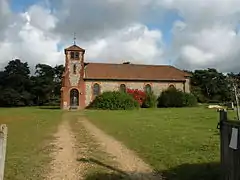Six Mile Bottom
Six Mile Bottom is a hamlet within the parish of Little Wilbraham, near Cambridge in England.
| Six Mile Bottom | |
|---|---|
 St George's Church | |
 Six Mile Bottom Location within Cambridgeshire | |
| Population | 83 (2006 estimate) |
| OS grid reference | TL577569 |
| District | |
| Shire county | |
| Region | |
| Country | England |
| Sovereign state | United Kingdom |
| Post town | NEWMARKET |
| Postcode district | CB8 |
| Dialling code | 01638 |
History
In the 1790s the only building at Six Mile Bottom was a paddock run by a stable keeper. In 1802, a sizeable country house was built nearby. Early residents were George and Augusta Leigh, the latter being Lord Byron's half-sister.[1] Their residence is now the Country House Hotel, Paddocks House.[2]
In 1807 the hamlet was the scene for a bare-knuckle fight between John Gully and Bob Gregson in which Gregson was defeated by Gully in a fight in 36 rounds lasting an hour and a quarter.[3]
There was little additional building until the 1840s, but it grew from there until there were 22 homes housing around 170 people in around 1920, most owned by the Six Mile Bottom estate.[4]
The hamlet derives its name from its distance from the start of Newmarket Racecourse and because it lies in a valley bottom.[5]
Six Mile Bottom railway station served the village from the 1860s (by the Newmarket and Chesterford Railway) until 1967.[4]
Village life
The hamlet had a pub/restaurant, The Green Man, which also provides accommodation (although now closed as a pub). It had served since the hamlet grew in the early 19th century, but may also be the same inn with stabling for 22 horses that was reported in 1686.[4] It has a social club, on the Brinkley Road. In the 1970s it was owned by ex-Flying Squad detective, Alec Eist, who had been dismissed for corruption.[6]
There was at one time a small school, reopened as a community centre in 1975. Christian services were held in the village's school from the 1890s to the 1920s. The brick-and-flint mission church of St George was built in 1933.[4][7]
Transport
The A1304 passes through the hamlet. There is one bus a day in each direction, on the route between Cambridge and Stetchworth; that is the only public transport. There was a railway station, Six Mile Bottom, on the Cambridge to Ipswich line. It is now a private residence.
Gallery
 The Green Man public house
The Green Man public house The old railway station
The old railway station
References
- Fraistat, Neil; Jones, Steven E.; Stahmer, Carl (eds.). The Byron Chronology: 1814-1816. University of Maryland, College Park. Retrieved 4 April 2009.
- "History". Swynford Paddocks hotel. Retrieved 4 April 2009.
- John Gully - Dictionary of National Biography, 1885-1900, Volume 23
- Wareham, A F; Wright, A P M (2002). Little Wilbraham, A History of the County of Cambridge and the Isle of Ely. 10: Cheveley, Flendish, Staine and Staploe Hundreds (north-eastern Cambridgeshire). Victoria County History. pp. 319–321. Retrieved 1 July 2011.
- A. D. Mills (2003). "A Dictionary of British Place-Names".
- Barnes, P. (19 August 1978). "Witnesses Divided As King Hearings Recess in House". The Washington Post. Archived from the original on 17 December 2019. Retrieved 22 October 2019.CS1 maint: ref=harv (link)
- Colburtn, Ben; Ynys-Mon, Mark (18 July 2005). "Cambridgeshire Churches: Six Mile Bottom, St George". www.druidic.org. Retrieved 4 April 2009.
| Wikimedia Commons has media related to Six Mile Bottom. |